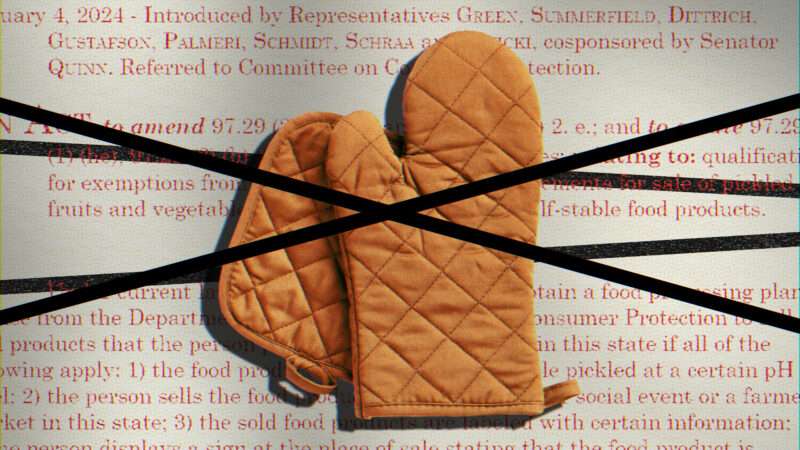
Since 2017, Wisconsinites have been legally allowed to sell a number of home-baked goods to the general public, free to make as much money as their products can garner. But a new bill being considered by the Wisconsin Legislature could change that, essentially making it impossible for so-called cottage food producers to make a living.
Assembly Bill 897 would increase "the sales threshold from $5,000 to $20,000" for homemade food products, according to a state analysis of the bill. That might seem like an improvement, but "the current sales cap applies only to canned goods," notes Jobea Murray, board president of the Wisconsin Cottage Food Association. "All other cottage food products are currently unlimited in their sales." (A bill being considered by the Senate would impose a slightly higher annual cap of $25,000.)
If enacted, A.B. 897 would create one of the strictest cottage food regimes in the country. The states that have a sales cap usually have a limit that's "high enough for home-based producers to earn a living wage," says Suranjan Sen, an attorney at the Institute for Justice (I.J.), a libertarian public interest law firm. "Florida's cap, for example, is $250,000 annually."
A $20,000 annual sales cap "would make Wisconsin's the most restrictive cap in the nation," he continues.
I.J. has twice sued Wisconsin to challenge restrictions on cottage food sellers. Following an I.J. lawsuit in 2017, a state court overturned a ban on selling home-baked goods. Home bakers previously risked fines of up to $1,000 or six months of jail time for selling products without a license. I.J. filed another suit against Wisconsin in February 2021, because despite the 2017 ruling, the state continued to ban Wisconsinites from selling homemade shelf-stable foods that aren't baked. That suit is pending.
"I believe that this cap would be unconstitutional and would violate the Wisconsin court orders that are right now in force," argues Sen. "The order from 2017 says that the government may not…require a license for sales of homemade shelf-stable baked goods." A sales cap bans sales past a certain threshold, violating that order. Sen also notes that the proposed sales cap would be applied unevenly since nonprofits would be exempt.
Proponents of the bill have argued that Wisconsin's current cottage food regime gives home-based sellers an unfair advantage over brick-and-mortar sellers. But 29 states "do not impose sales caps on cottage food," according to the Wisconsin Institute for Law & Liberty, a nonprofit conservative law firm. There's little reason to believe that a sales cap—especially such a low one—would be necessary to protect traditional food businesses.
It would, however, discourage Wisconsinites from starting their own home-baked goods businesses, since they would be legally barred from earning enough to make a living.
"The $20,000 cap in today's food economy means about $5,000 to $10,000 profit a year," says Murray. "That is absolutely not enough to encourage someone to try a home-based baking business, so that means fewer market vendors, fewer customers, and less small business activity in a downtown or neighborhood."
Though hopeful food entrepreneurs have the option to get licensed and rent space in a commercial kitchen, this is an expensive and prohibitive path for many. Cottage food sales grant much more flexibility—and are often the best option—for people who need to work from home, would prefer not to work a traditional 9-to-5 schedule, or are unable to obtain a license. Shutting down that pathway both stifles entrepreneurship and protects incumbents in the market.
"With the COVID pandemic and everything, it's high time we recognize that people need options to be able to support themselves from home," says Sen. "Most of us have access to a home kitchen, and we should be welcoming this. This makes our communities a more vibrant, more welcoming, more special place."
Murray points out that there are several other problems with the bill beyond the sales cap. "It was written without the knowledge of how the cottage food industry works, and lacks clarity on certain points," she says. "For instance, many home-bakers use an online platform to take orders and send invoices, offer shipping within the state, sell at pop-ups around the community, and/or sell via farmstand. None of these options are included in the bill as written."
"This bill has too many issues to even be salvageable," continues Murray. "We are hopeful the committee looking over this bill understands these many issues we have brought to their attention and acts accordingly."
The post Wisconsin Could Make It Impossible for Cottage Food Producers To Make a Living appeared first on Reason.com.







